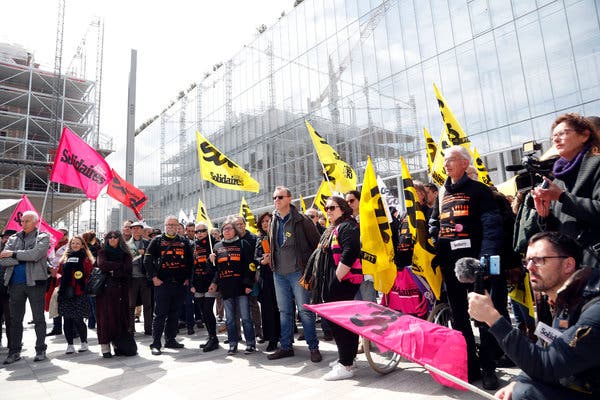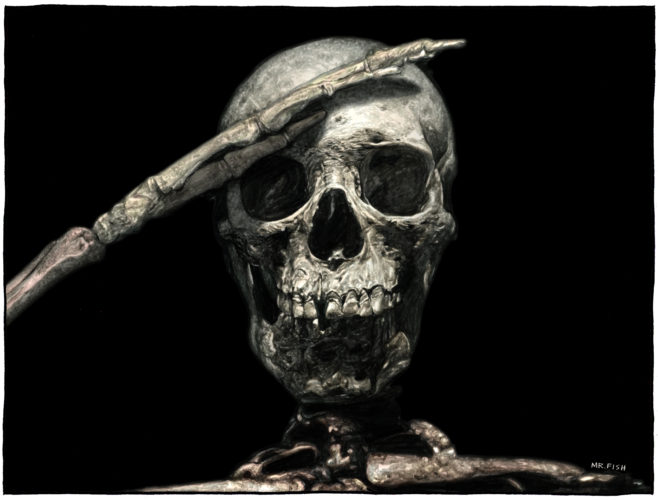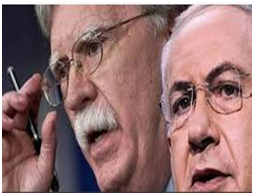Bulletin
N° 854
“Tale of Tales”
film by Yuri Norstein
Subject :
The
Invisible Power of Debt Slavery

Bastille Day 2019
Grenoble, France
Dear Colleagues and Friends of CEIMSA,
While studying social history at the University of Wisconsin-Madison in the late 1960s, I came in contact with George Mosse, the intellectual historian at UW who had recently published a new book on cultural life under the Third Reich, Nazi Culture: Intellectual, Cultural and Social Life in the Third Reich (1966). While my own studies of social history brought me into a more active life of war resistance and other contemporary social movements, the intellectual history of Germany was useful to understand the transformation of social systems from liberal capitalist structures into quasi-totalitarian modes of existence which wars have produced again and again.
As the political economy of a given era evolves, so do interpersonal relationships; and, during the Vietnam War era, cultural upheavals were occurring around the world – blacks, women, workers, soldiers, youth, students, and gays were all reaching out to communicate fundamentally democratic urges for a better life, an end to alienation and exploitation. The potential for social alliances was never greater, and the forces of “law and order” had to take proactive measures to secure the corporate grip and finacial control of political power.
This is where Professor Mosse’s documentary study of the modalities of Nazi culture becomes instructive. He introduces his 386-page book on Nazi culture with the observation: “Hitler wrote and talked continually, and what he had to say about cultural activity would fill may volumes. The purpose of our small selection is merely to reflect in his own words the direction of thought contained in the material which follows.” Professor Mosse begins his presentation with selections taken from Mein Kampf, first because it was required reading in all German schools; also, because even if it was not read, “it’s contents were spread throughout the nation by the whole Nazi cultural drive.”(p.1) Hitler dictated the book to his deputy, Rudolf Hess, between July and December 1924, when they were incarcerated together in the Bavarian Landsberg fortress following the unsuccesful Nazi Putsch of November 8-9, 1923. The book had more than a political purpose; it represented Hitler’s most profound beliefs, and from his selection of documents Mosse reveals how through determined and skillful indoctrination, these early ideas were little by little inculcated in German society, until by the mid 1930s the slogan became widespread: “Hitler is Germany, and Germany is Hitler.”(p.2)
These beliefs were based upon the
primacy of the world view in determining man’s fate. The power of an ideal was
all-important, and in one passage Hitler links this to the war experience.
Idealism is contrasted with materialism, symbolized by what he calls the teachings
of Marxism which have also infected the bourgeoisie. His own world view is Volkish: based upon the racial principles which are
fundamental to all of life. Thus race is the foundation of all culture. The
state is only a means to the end of preserving the race, and we will find this
concept of the state made law ten years later in his Third Reich. Racial ideas
are combined with a belief in an aristocracy which rises from the mass of the
population. Hitler stressed the “great personality” who made history – but
always on the foundation of a common racism: personal ethics must be related to
the basic factor of life. All culture is the product of the Aryan: only he can
produce true personalities.
As culture is the expression of an ideal,
materialism can never produce culture. Materialism has taken hold of the
bourgeoisie through the influence of Marxism, an invention of the Jews. They
are the true adversary of the Germanic world view and must be dealt with
ruthlessly. Jews cannot produce culture, but they do serve a function
symbolizing all that is evil, they spur the Aryan on to
struggle against them and thus to become ever more conscious of his own race.
Therefore Hitler, adopting a phrase of Goethe, calls Jews a power which wants
evil but produces good.(p.2)
How Hitler’s views could be turned into an applied social philosophy in Germany and beyond is the theme of this book. On April 27, 1923, Hitler already stressed the intention to implement his ideas, at the levels of formal education, of instinct, and of will:
A change in education is a further
necessity: today we suffer from over-education. Only knowledge is prized. The
know-it-alls are the enemies of action. What is needed is instinct and will.(p.10)
On July 18, 1937, Hitler spoke at the opening of the House of German Art in Munich, which was built to replace the Glass Palace, built in 1858, and had been destroyed by fire in the early summer of 1931, along with more than 3,000 irreplaceable works of celebrated German artists. Hitler took this opportunity to further propagate his understanding of “true” art and culture:
When
on June 6, 1931, the Glass Palace was burned down there perished with it an
immortal treasure of German art. The artists were called Romantics, and yet
they were but the finest representatives of that German search for the real and
true character of our people, for an honest and decent expression of this law
of life divined by our people. For it was not only their choice of subject
which was decisive but the clear and simple mode of rendering these sentiments.
Many of their original works are lost, we possess only copies or reproductions,
but the works of these masters are removed by a great gulf from the pitiable
products of our modern so-called “creative artists.” These masters felt
themselves to be Germans, and consequently they created works which should be
valued as long as there should be a German people to appreciate them. But these
modern works we would also preserve as documents illustrating the depths of that
decline into which the people had fallen. The “Exhibition of Degenerate Art” is
intended as a useful lesson.
During the long years in which I planned
the formation of a new Reich I gave much thought to the tasks which would
await us in the cultural cleansing of the people’s life: there was to be a
cultural renascence as well as a political and economic reform. I was convinced
that peoples which have been trodden underfoot by the whole world of their day
have all the greater duty consciously to assert their own value before their
oppressors, and there is no prouder proof of the highest rights of a people to
its own life that immortal cultural achievements. I was therefore always
determined that if fate should one day give us power I should discuss these
matters with no one but would form my own decisions, for it is not given to all
to have an understanding for tasks as great as these. Among the plans which
floated before me in my mind both during the war and after the collapse was the
idea of building a great new exhibition place in Munich; and many years ago I
thought of the place where the building now stands. In 1931, I feared that I
should be anticipated and that the “men of November” would erect an exhibition
building. Plans indeed were produced for an edifice which might have served for
a railway station or a swimming bath. But when we came to power in 1933 the
plan had not been executed: the erection of the building was left to the Third
Reich. And the building is so unique, so individual, that it cannot be compared
with anything else: it is a true monument for this city and more than that –
for German art . . . . It represents a
turning point, the first of the new buildings which will take their place among
the immortal achievements of German artistic life.
But the House is not enough: it must house
an Exhibition, and if now I venture to speak of art I can claim a title to do
so from the contribution which I myself have made to the restoration of German art.
For our modern German state that I with my associates have created has alone
brought into existence the conditions for a new, vigorous flowering of art. It
is not Bolshevist art collectors or their henchmen who have laid the
foundations; we have provided vast sums for the encouragement of art, we have
set before art itself great, new tasks. As in politics, so in German art-life:
we are determined to make a clean sweep of phrases.
. . .
The artist does not create for the
artist: he creates for the people and we will see to it that henceforth the
people will be called in to judge its art. No one must say that the people has no understanding for a really valuable enrichment
of its cultural life. Before the critics did justice to the genius of a Richard
Wagner he has the people on his side, while the people has
had nothing to do with so-called “modern art.” The people regarded this art as
the outcome of an impudent and unashamed arrogance or of a simply shocking lack
of skill; it felt that this art-stammer – these achievements which might have
been produced by untalented children of from eight to ten years old – could
never be valued as an expression of our own times or of the German future. When we
know today that the development of
millions of years repeats itself in every individual compressed into a few
decades, then this art, we realize, is not “modern”; it is on the contrary in
the highest degree “archaic,” far older probably than the Stone Age. The people
when it passes through the galleries will recognize in me its own spokesman and
counselor: it will draw a sigh of relief and express its glad agreement with
this purification of art. And that is decisive: an art which cannot count on
the readiest and most intimate agreement of the great mass of the people, an
art which must rely upon the support of small cliques, is intolerable. Such an
art does but endeavor to confuse, instead of gladly reinforcing, the sure and
health instinct of a people. The artist cannot stand aloof from his people.
This exhibition is but a beginning, yet the end of the artistic stultification
of Germany has begun. Now is the opportunity for youth to start its industrious
apprenticeship, and when a sacred conscientiousness at last comes into its own,
then I doubt not that the Almighty, from the mass of these decent creators of
art, will once more raise up individuals to the eternal starry heaven of the
imperishable God-favored artists of the great periods. We believe that
especially today, when in so many spheres the highest individual achievements
are being manifested, so also in art the highest value of personality will once
again assert itself.(pp.13-16)
In another section of this anthology of Nazi documents, Professor Mosse turns from Hitler’s view of culture and art to the Nazi education of youth as the “key” to social transformation.
Nazism, like any revolutionary movement:
attempts to capture the new generation and rally it to the cause. The movement
stressed youth, at the expense of the older generation, which might still
harbor vestiges of liberalism or even socialism. Education, therefore, can show
us the principal application of the cultural impetus within the Third Reich. The Nazis did
make changes in the school system, thought the federal structure of the Reich
made this difficult qt first. Until the individual states
were abolished, Prussia as the laboratory for much of this change. High
schools specializing in natural science and a non-classical curriculum were put
on the same footing as the ancient and prestigious humanistic Gymnasia. The
Nazi attempted to unify the school system, as they “meshed the gears” of all
other activities in the Third Reich.
As a matter of fact, changes in curriculum
brought all schools closer together. Compulsory training in racial biology . .
. and a grater emphasis on German history and
literature meant that less time could be spent on other subjects, such as
ancient languages and even science. The former were ,
of course, subjects with a high ideological content. Moreover, at least five
hours a day were set aside for physical education, because of its value in
building character and discipline as well as for future military usefulness. A
valiant attempt was made to give girls a different education, in accordance
with the Nazi ideal of womanhood . . . . They were to be excluded from subjects
required for admission to a university, for the woman belonged in the home.
It is difficult to say just how successful
the Nazi reshaping of education proved to be in practice. It must have varied
greatly from school to school and depended a great deal on individual teachers
and principals. For example, until March 1, 1938, the sifting of textbooks for
schools was handled in a haphazard way; at times the individual schools did
their own censoring. Only after that date did a centralized censorship come
into existence, to be exercised by a Nazi party commission in collaboration
with the Ministry of Education. Yet the textbooks were increasingly National
Socialist, the teachers were regimented, and, perhaps most important of all,
some of the youth responded with great enthusiasm.
Evidence for the enthusiasm of the youth
comes to us from all sides. The examples we have chosen should be especially
telling, for they were written by opponents of the regime. Inge
Scholl tells of herself, her brother and sister, who founded a resistance group
among their fellow students at the University of Munich which was called “The
White Rose.” Sophie and Hans Scholl paid dearly for their convictions – both
were executed in 1943. Yet initially, the Scholl youngsters were enthusiastic
supporters of the Nazi movement and the reasons for their emotional commitment,
given in the document, are typical of those held by many of the young people.
The description of Han’s early disillusionment is less typical, but it does
show how the Nazis attempted to control this youthful enthusiasm. (pp.263-264)
The following document describes activities inside a public school in Munich at the start of the Third Reich, where the "White Rose" resistance group later formed. Here Inge Scholl (b. 1917) recounts the experiences of her younger brother Hans (age 15) and her little sister Sophie (age 12):
One morning, on the school steps, I heard
a girl form my class tell another: “Hitler has just
taken over the government.” And the radio and all the newspapers proclaimed ; “Now everything will improve in Germany. Hitler
has seized the helm.”
For the first time politics entered our
lives. Hans at the time was fifteen years old; Sophie was twelve. We heard a
great deal of talk about Fatherland, comradeship, community of the Volk,
and love of homeland. All this impressed us, and we listened with enthusiasm
whenever we heard anyone speak of these things in school or on the street. For
we loved our homeland very much – the woods, the great river, and the old gray
retaining walls that rose on the steep slopes between groves of fruit trees and
vineyards. We were reminded of the smell of moss, of soft earth and spicy
apples, when we thought of our homeland. And every square foot of it was well
known and very dear to us. Fatherland – what else was it but the grater
homeland of all who spoke the same language and belonged to the same people! We
loved it, but were hardly able to say why. Until that time we had never lost
many words over it. But now it was written large, in blazing letters in the
sky. And Hitler, as we heard everywhere, Hitler wanted to bring greatness,
happiness, and well-being to this Fatherland; he wanted to see to it that
everyone had work and bread; he would not rest or relax until every single
German was an independent, free, and happy man in his Fatherland. We found this
good, and in whatever might come to pass we were determined to help to the best
of our ability. But there was yet one more thing that attracted us with a
mysterious force and pulled us along – namely, the compact columns of marching
youths with waving flags, eyes looking straight ahead, and the beat of drums
and singing. Was it not overwhelming, this fellowship? Thus it was no wonder
that all of us – Hans and Sophie and the rest of us – joined the Hitler Youth.
We were in it heart and soul, and could
not understand why our father did not happily and proudly say “yes” to it all.
On the contrary, he was quite opposed to it and on occasion he would say:
“Don’t believe them; they are wolves and wild beasts, and they are frightfully
misusing the German people” And on occasions he compared Hitler with the Pied
Piper of Hamelin, who enticed the children with his pipe to follow him into
perdition. But Father’s words were lost in the wind and his attempts to hold us
back came to naught in the face of our youthful enthusiasm.
We went with our comrades of the Hitler
Youth on long hikes and rambled in wide sweeps through our homeland, the Swabian Alps.
We
marched long and strenuously, but we did not mind; we were much too
enthusiastic to admit fatigue. Wasn’t it wonderful suddenly to have something
in common, a bond with other young people whom otherwise we might never have
come to know? In the evenings we met at the den, and someone would read, or we
sang, or played games and did craft work. We heard that we should live for a
great cause. We were taken seriously; and indeed in a very special way, and
that gave us a special buoyancy. We believed ourselves to be members of a
great, well-ordered organization which embraced and esteemed everybody form the
ten-year-old-boy to the adult man. We felt we were part of a process, of a
movement that created a people out of a mass. Certain matters that seemed senseless
or left us with a bad taste would eventually adjust themselves - or so we believed; one day, after a long
bike tour, as we were resting in our tents under a immense starry sky, a
fifteen-year-old classmate said to me unexpectedly; “Everything would be fine –
but this business about the Jews, I can’t swallow that.” The girl leader said
Hitler must know what he was doing and that for the sake of the greater cause
one had to accept what seemed to be difficult and incomprehensible. But the
other girl was not entirely satisfied with this answer; others agreed with her
and suddenly one could hear in them the voices of their parents. It was a
restless night in the tent, but eventually we became too tired to stay awake.
And the next day was indescribably beautiful and full of new adventures. For
the time being, the talk of the night before was forgotten.
In our groups we held together like close
friends. The comradeship was something very beautiful.
Hans had assembled a collection of folk songs,
and his young charges loved to listen to him sing, accompanying himself on his
guitar. He knew not only the songs of the Hitler Youth but also the folk songs
of many peoples and many lands. How magically a Russian or Norwegian song
sounded with its dark and dragging melancholy. What did it not tell us of the
soul of those people and their homeland!
But some time later a peculiar change took
place in Hans; he was no longer the same. Something disturbing had entered his
life. It could not be the remonstrances of his father
– no, because to them he simply played deaf. It was something else. His songs
were forbidden, the leader had told him. And when he had laughed at this, they
threatened him with disciplinary action. Why should he not be permitted to sing
these beautiful songs? Only because they had been created by other peoples? He
could not understand it, and this depressed him, and his usual carefree sprit
began to wane.
At this particular time he was given a
very special assignment. He was to carry the flag of his troop to the party’s
national really at Nuremberg. He was
overjoyed. But when he returned we hardly dared trust our eyes. He looked
tired, and on his face lay a great disappointment. We
did not expect an explanation, but gradually we learned that the youth movement
which there had been held up to him as an ideal image was in reality something
totally different form: what he had imagined the Hitler Youth to be. There
drill and uniformity had been extended into every sphere of personal life. But
he had always believed that every boy should develop his own special talents.
Thus through his imagination, his ingenuity, his unique personality, each
member could have enriched the group. But in Nuremberg everything had been done
according to the same mold. There had been talk, day and night, about loyalty. But what as the keystone of all loyalty if not to be true to
oneself? . . . My God! There was
a mighty upheaval taking place in Hans.
One day he came home with another
prohibition. One of the leaders had taken away a gook by his most beloved
writer, Stellar Hours of Mankind by Stefan Zweig. It was forbidden, he
was told. Why? There had been no answer. He heard something similar about
another German writer whom he liked very much. This one had been forced to
escape from Germany because he had been engaged spreading pacifist ideas.
Ultimately to came to an
open break.
Some time before, Hans had been promoted
to standard-bearer. He and his boys had sewn themselves a magnificent flag with
a mythical beast in the center. The flag was something very special: it had
been dedicated to the Führer himself. The boys
had taken an oath on the flag because it was the symbol of their fellowship.
But one evening, as they stood with their flag in formation for inspection by
the higher leader, something unheard-of happened. The visiting leader suddenly
ordered the tiny standard-bearer, a frolicsome twelve-year-old lad; to give up the
flag. “You don’t need a special flag. Just keep the one that has been
prescribed for all.” Hans was deeply disturbed. Since when? Didn’t the troop leader know what this
special flag meant to its standard-bearer? Wasn’t it more than just a piece of
cloth that could be changed at one’s pleasure?
Once more the leader ordered the boy to
give up the flag. He stood quiet and motionless. Hans knew what was going on in
the little fellow’s mind and that he would not obey. When the high leader in a
threatening voice ordered the little fellow for the third time, Hans saw the
flag waver slightly. He could no longer control himself. He stepped out of line
and slapped the visiting leader’s face. From then on he was no longer the
standard-bearer. (pp.271-274)
Professor Mosse concludes his presentation of original documents portraying Nazi culture in Chapter 11, with an observation on “The Assumption of Power”:
If
there had been barricades instead of legality in 1933, men and women would have
been forced to make more reasoned decisions. The legal assumption of power,
however, allowed them to drift into the open arms of the Third Reich, finding themselves in an embrace from which there was no escape,
except prison or exile. Conformity took precedence over personal friendships,
however old and valued. Yet we must always remember that there were many who
were enthusiastic for the new order, to whom the Nazi
ideology seemed to give a new meaning to life.
Fellow traveler or
adept, both found themselves partners in the most far-reaching attempt to
impose a monolithic cultural pattern upon a modern nation which the Western
world had yet seen. Throughout this book we have been concerned with the
way in which this pattern was made to penetrate into the population,
and with it the world view for which it stood. We can now see the Nazi
assumption of power in its proper dimensions – as opening the gate through
which this Nazi culture poured down upon the people. That it struck so many
responsive chords is perhaps the greatest tragedy of all. Men will rationalize,
will allow themselves to drift into situations, but that millions should have
identified themselves wholly and unconditionally with Nazi culture gives a
seriousness to these documents which cannot be brushed aside as merely the
creation of clever or successful propaganda.(pp.367-368)
This unusual documentary history of Nazi culture, delineating its theory and its practice, offers readers a lesson in the acquisition of cultural hegemony and the self-deceptions that pave the way to quiescent enslavement and ultimately to massive self-destruction.
The 15 + items below reflect the multiple crises that we are facing this summer, as capitalism in its neoliberal guise is slipping toward a totalitarian society, the only “rational” aim of which is self-annihilation.
Francis Feeley
---
Professor emeritus of American Studies
University Grenoble-Alpes
Director of Research
University of Paris-Nanterre
Center for the Advanced Study of American Institutions
and Social Movements
The University of California-San Diego
a.
Limits of
Knowledge & Thought
https://www.youtube.com/watch?v=A1RrbexZ5LY
with Noam Chomsky
+
The Persistence of Neoliberalism Despite its Loss of
Legitimacy
with David Harvey
1/2
(15min)
+
The Limits of Social Democracy and of
the Welfare State
with David Harvey
2/2
(13min)
===========
b.
Suicide as Corporate
Murder: France Télécom on Trial
https://truthout.org/articles/suicide-as-corporate-murder-france-telecom-on-trial/
by Sarah Waters
+
35 Employees Committed
Suicide. Will Their Bosses Go to Jail?

French union members
outside the Paris courthouse at the start of the trial of France Télécom in May.CreditCreditThibault
Camus/Associated Press
by Adam Nossiter
PARIS, 9 July 2019 — In their blue blazers and tight haircuts, the aging men look uncomfortable in the courtroom dock. And for good reason: they are accused of harassing employees so relentlessly that workers ended up killing themselves.
The men — all former top executives at France’s giant telecom company — wanted to downsize the business by thousands of workers a decade ago. But they couldn’t fire most of them. The workers were state employees — employees for life — and therefore protected.
So the executives resolved to make life so unbearable that the workers would leave, prosecutors say. Instead, at least 35 employees — workers’ advocates say nearly double that number — committed suicide, feeling trapped, betrayed and despairing of ever finding new work in France’s immobile labor market.
Today the former top executives of France Télécom — once the national phone company, and now one of the nation’s biggest private enterprises, Orange — are on trial for “moral harassment.” It is the first time that French bosses, caught in the vise of France’s strict labor protections, have been prosecuted for systemic harassment that led to worker deaths.
Advertisement
The trial has riveted a country deeply conflicted about capitalism and corporate culture, and may help answer a question that haunts the French as they fitfully modernize their economy: How far can a company go to streamline, shed debt and make money?
If convicted, the ex-executives face a year in jail and a $16,800 fine. But even before the trial wraps up on July 12, with a verdict sometime later, it has become a landmark in the country’s often hostile relations between labor and management.
As President Emmanuel Macron has sought to make France more business-friendly, he has run into a buzz saw of strikes and faced a revolt among Yellow Vest protesters who accuse him of being the president of the rich. While many workers complain they struggle to make ends meet, employers say a system of generous social benefits and worker protections makes hiring onerous and stifles job creation.
Didier Lombard, the former chief executive of France Télécom, center, was recorded saying in 2007 that he would reach the quota of layoffs “one way or another, by the window or by the door.”

Didier Lombard, the former chief
executive of France Télécom, center, was recorded
saying in 2007 that he would reach the quota of layoffs “one way or another, by
the window or by the door.”CreditStephane De Sakutin/Agence France-Presse — Getty Images
The trial has become a searing demonstration of those lingering tensions.
France Télécom was caught flat-footed by the digital revolution, as fixed-line subscribers dropped away by the thousands. The state ordered the company to go private in 2003, and by 2005, it was over $50 billion in debt.
Advertisement
Company executives thought they needed to get rid of 22,000 workers out of 130,000 — a necessity contested by the prosecution — to ensure survival.
“They were stuck, cornered,” said Michel Ledoux, one of the plaintiffs’ lawyers. “The only possibility was to make them leave, one way or another.”
Weeks of wrenching testimony about despairing employees who hanged themselves, immolated themselves, or threw themselves out of windows, under trains and off bridges and highway overpasses, have suggested that the former executives went very far in “pushing the company into the new century,” as corporate strategy dictated.
The executives include Didier Lombard, the former chief executive officer; Louis-Pierre Wenès, his No. 2; Olivier Barberot, the former head of human resources; and four others.
A grim universe of underemployment, marginalization, miscasting and systematic harassment was established at the huge company, according to testimony at the trial.
The executives “sought the destabilization of the workers,” prosecutor Francoise Benezech said in her summing up on Friday.
A France Télécom store in Paris in 2009. The state-owned, old-fashioned telephone company was caught flat-footed by the digital revolution.CreditLucas Dolega/European Pressphoto Agency
Image
A France Télécom store in Paris in 2009. The state-owned, old-fashioned telephone company was caught flat-footed by the digital revolution.CreditLucas Dolega/European Pressphoto Agency
“People who had worked outside their whole career were suddenly put in front of a computer,” said Frédérique Guillon, a worker advocate who testified at the trial, in an interview. “There were people whose work was simply taken away from them.”
Advertisement
Among those victims, the youngest was Nicolas Grenouville, 28, who was wearing a company T-shirt when he put an internet cable around his neck and hanged himself in a garage, Mr. Ledoux told the court this week.
“I can’t stand this job anymore, and France Télécom couldn’t care less,” Mr. Grenouville wrote shortly before his death in August 2009. “All they care about is money.”
An introspective technician used to working alone on the phone lines, praised for his scrupulousness, Mr. Grenouville was suddenly pitched into a sales job dealing with customers. He couldn’t stand it. “They threw him out into the arena without a speck of training,” Mr. Ledoux told the court.
The day before his suicide he had worked a 12-hour day with one 30-minute break. “Little Nicolas took this violence right smack in the face,” Mr. Ledoux said.
Camille Bodivit, 48, had been a planner at the company when suddenly his job description began to shift. He threw himself off a bridge in Brittany in 2009. “Work was everything for him,” his partner’s lawyer, Juliette Mendès-Ribeiro, told the court Tuesday.
“You killed my father — why?” asked Noémie Louvradoux last week, turning to the defendants, in one of the trial’s most widely reported moments. Her father, Rémy, set himself on fire in 2011 in front of a France Télécom office near Bordeaux, in despair over successive marginal reassignments.
Advertisement
“This isn’t going to be lacework here,” the the former head of human resources of France Télécom, Olivier Barberot, center, said in 2007. “We’re going to put people in front of life’s realities.”CreditYoan Valat/EPA, via Shutterstock
Image
“This isn’t going to be lacework here,” the the former head of human resources of France Télécom, Olivier Barberot, center, said in 2007. “We’re going to put people in front of life’s realities.”CreditYoan Valat/EPA, via Shutterstock
In their defense, the former executives have cited the intense pressure of a competitive and changing marketplace.
“The company was going under and it didn’t even know it,” Mr. Lombard, the ex-chief executive, testified. “We could have gone about it much more gently if we hadn’t had the competition banging on our door.”
Unfortunately for Mr. Lombard, he was recorded saying in 2007 that he would reach the quota of layoffs “one way or another, by the window or by the door.” The window is what a number of the employees chose.
“This isn’t going to be lacework here,” Mr. Barberot said in 2007. “We’re going to put people in front of life’s realities.”
To the mounting signs of distress management turned a deaf ear, testimony at the trial suggested.
Noëlle Burgi, a sociologist who worked with the employees during the suicide wave and testified at the trial, said in an interview that it was “a process of humiliation.”
“You were put in an office, underground,” Ms. Burgi said. “There was one guy who was literally kicked out of his office. He didn’t understand.”
Advertisement
The suicides and testimony made clear that France’s chronically high unemployment rate had left many of the workers feeling especially vulnerable.
France Télécom employees marching in Lannion after the suicide of a colleague in 2009.CreditDavid Vincent/Associated Press
Image
France Télécom employees marching in Lannion after the suicide of a colleague in 2009.CreditDavid Vincent/Associated Press
“Before, when there was full employment, if you were unhappy at work, you could tell your boss to go to hell,” Ms. Guillon said.
But those conditions haven’t existed for years in France, where the labor market is stagnant and immobile by American standards, and workers have little culture of moving cross-country for a new job.
It is clear that these France Télécom employees had signed on expecting to finish their careers at the company. “Eighty percent were there to stay until the end of their professional life,” Pascale Abdessamad, a France Télécom worker who also testified, said in an interview.
Most of the employees were deeply dedicated to their work, testimony indicated. A company like France Télécom, iconic in French life for years, was an apparent lifelong security blanket.
“These companies were considered family,” Mr. Ledoux told the court. To be mistreated by one is extremely transgressive,” he said.
Advertisement
France’s executive caste, normally mutually supportive, has been notably silent about the executives on trial, while France’s workers have watch the proceedings with special glee.
The courtroom is filled with current and former company employees who look on with disapproval at the silent row of jacketed defendants.
“Even if the penalties are low, it will be a nice stain on their jackets,” said Noel Rich, a France Télécom employee who had come to observe the trial.
“These are guys who are used to hanging out with ministers,” Mr. Rich added. “There’s been no words of compassion for the little guy.”
Correction: July 10, 2019
An earlier version of this article included an incorrect reference to France Télécom’s financial history. By 2005, the company was over $50 billion, not $50 million, in debt.
A version of this article appears in print on July 10, 2019, on Page A1 of the New York edition with the headline: French Confront A Work Culture.
===========
c.
War, Memory and Gettysburg

https://www.truthdig.com/articles/war-memory-and-gettysburg/
by Chris Hedges
+
The Five Stages of Collapse
http://www.informationclearinghouse.info/51912.htm
by Dmitry Orlov
===========
d.
From: Mark Crispin Miller
Sent: Wednesday, July 10, 2019
Subject: [MCM] Alex Acosta was told that Jeffrey Epstein "'belonged
to intelligence,' and to leave it alone"
Alex Acosta Reportedly Claimed
Jeffrey Epstein ‘Belonged to Intelligence’

by Michael Krieger
To appreciate the significance of what I’m about to share, you really need to go back and read yesterday’s post: The Jeffrey Epstein Rabbit Hole Goes a Lot Deeper Than You Think.
In that piece, I shared many lesser known, but extremely bizarre facts about Jeffrey Epstein and the people around him. I also noted that it appeared his real job was to run a blackmail operation to ensnare some of the most wealthy and powerful people on earth. I alluded to the possibility that he was collecting this priceless information on behalf of a third party, and then just today we learn the following via the Daily Beast: “Is the Epstein case going to cause a problem [for confirmation hearings]?” Acosta had been asked. Acosta had explained, breezily, apparently, that back in the day he’d had just one meeting on the Epstein case. He’d cut the non-prosecution deal with one of Epstein’s attorneys because he had “been told” to back off, that Epstein was above his pay grade. “I was told Epstein ‘belonged to intelligence’ and to leave it alone,” he told his interviewers in the Trump transition, who evidently thought that was a sufficient answer and went ahead and hired Acosta. (The Labor Department had no comment when asked about this.)…
For almost two decades, for some nebulous reason, whether to do with ties to foreign intelligence, his billions of dollars, or his social connections, Epstein, whose alleged sexual sickness and horrific assaults on women without means or ability to protect themselves is well-known in his circle, remained untouchable.
It should be noted the reason I attach credibility to the above is based on who wrote it, Vicky Ward. She has an extensive history of digging into Epstein, and wrote one of the earliest profiles on him back in 2003. As she notes in today’s article: I spent many months on his trail in 2002 for Vanity Fair and discovered not only that he was not who he claimed to be professionally, but also that he had allegedly assaulted two young sisters, one of whom had been underage at the time. Very bravely, they were prepared to go on the record. They were afraid he’d use all his influence to discredit them—and their fear turned out to be legitimate.
As the article was being readied for publication, Epstein made a visit to the office of Vanity Fair’s then-editor, Graydon Carter, and suddenly the women and their allegations were removed from the article. “He’s sensitive about the young women,” Carter told me at the time. (Editor’s Note: Carter has previously denied this allegation.) He also mentioned he’d finagled a photograph of Epstein in a swimsuit out of the encounter. And there was also some feeble excuse about the article “being stronger as a business story.” (Epstein had also leaned heavily on my ex-husband’s uncle, Conrad Black, to try to exert his influence on me, which was particularly unwelcome, given that Black happened to be my ex-husband’s boss at the time.)
Many people had assumed Epstein was untouchable merely because he had so much dirt on so many powerful people, but it increasingly looks far bigger than that. It appears he may have been untouchable because he was systematically collecting this information on behalf of an intelligence agency. If so, we need to find out precisely who he was working for.
This should be the number one story in the country right now. Blackmail at this level is a genuine national security issue.
_________________________________
Replying to @LibertyBlitz
Wow.
Apparently Acosta claimed Epstein "belonged to intelligence" and was told to back off.
It's all making sense now.https://www.thedailybeast.com/jeffrey-epsteins-sick-story-played-out-for-years-in-plain-sight …

Michael Krieger@LibertyBlitz
If we can somehow get to the bottom of Epstein I suspect we’ll learn a lot about how the world of the powerful really works, and why everything is so fked and corrupt.
298
1:58 PM - Jul 9, 2019
Twitter Ads info and privacy
126 people are talking about this
---
To view this discussion on the web visit https://groups.google.com/d/msgid/newsfromunderground/CAGxB6W-aq%3DdH1%2BzqQnm4LtcY6Y%3DEEKHQ1SmugWWTPxR6ZZ3toQ%40mail.gmail.com.
===========
e.
US-UK special relationship, is it
policy fact of fiction?
https://youtu.be/7yIGJxX5ZdE
with Peter Lavelle and Alex Christoforou
+
"What's happening to Corbyn is a trial run for Bernie Sanders"
with George Galloway & Norman Finklestein
+
Noam Chomsky tells Lowkey exactly what's driving the anti-Corbyn
campaign
+
"Gaza: Watch
George Galloway's incredible interview with Laura Loomer"
+
Bolton and Netanyahu killed 2005 Iran
talks, ‘lured’ Trump into shredding 2015 deal - Iranian FM

https://www.rt.com/news/463735-bolton-netanyahu-killed-iran/
+
Will Trump follow suit if Israel
attacks Iran?

by Ben Caspit
+
Gibraltar police arrest Iranian
tanker’s captain, chief officer
Police in Gibraltar have arrested the captain and the chief officer of Iran’s super tanker, ‘Grace 1’, which was earlier seized by British marines and local police officers, local media report.
===========
f.
+
"On Contact:
George Galloway on populism, racism and antisemitism"
with Chris Hedges
===========
g.
From: Mark Crispin Miller
Sent: Wednesday, July 10, 2019
Subject: [MCM] Help defend Nils Melzer—who exposed the torture of Assange—from a pseudo-feminist attempt to take him down
(much like the one deployed against Assange)
I signed Suzie's letter—as a supporter, not as a survivor—and you can, too.
Please send it far and wide.
MCM
From Suzie Dawson:
Mark,
Last week, a group of human rights advocates called 'Atlas Women' tried to get UN Special Rapporteur on Torture Nils Melzer fired.
He had recently exposed the torture of Julian Assange. They claimed to take issue with some of his commentary about the case, and
ostensibly for the protection of rape survivors, issued an open letter decrying Melzer's conduct to his UN bosses and implored several
hundred academics around the world to sign on to the letter.
Indignant at this blatant politicization of the topic of rape and sexual violence, I wrote a counter letter in return, letting rip about my
feelings on this matter, and amazingly some 117 survivors of sexual assault and a further nearly 300 supporters signed my counter
letter in support of Melzer. Your readers and supporters can access my letter here, and leave a comment if they also wish to co-sign it:
https://contraspin.co.nz/not-in-my-name-academics-publicly-attacking-un-torture-rapporteur/
Warning, it's a pretty harrowing read, but I think it has been a very long time coming for a lot of people, that we have this conversation.
For too long, rape and sexual violence have been unfairly used as an excuse to take down political targets. So we are collectively saying
no more: Not In Our Name.
Thanks!
Suzie
________________
To view this discussion on the web visit https://groups.google.com/d/msgid/newsfromunderground/CAGxB6W-yE3Db-2VvR0XDEkPZdxD%3D2MAMw_-xwdaDwgUK8_wtjA%40mail.gmail.com.
+
Top Assange
Defense Account Deleted By Twitter
https://caitlinjohnstone.com/2019/07/12/top-assange-defense-account-deleted-by-twitter/
by Caitlin Johnstone
+
Roger Waters brands Twitter ‘thought police’for suspending Assange support account
https://www.rt.com/news/464082-waters-twitter-unity4j-suspended/
+
Selling Out Julian Assange
https://jacobinmag.com/2019/07/julian-assange-ecuador-lenin-moreno-rafael-correa
with Txema Guijarro
+
U.N. Report Condemns Torture of Assange
https://www.truthdig.com/articles/the-media-is-complicit-in-julian-assanges-torture/
by Robert Scheer
===========
h.
"Killing Jamal Khashoggi: How a Brutal Saudi Hit Job Unfolded | NYT -
Visual Investigations"
+
Another Ethically Challenged NYTimes "Journo" Is Covering Bernie
with Jimmy Dore
+
CIA and Mossad:
Tradeoffs in the Formation
with Jefferson Morley
===========
i.
Historians
for Peace and Democracy
From: Jim O'Brien
via H-PAD
Sent: Friday, July 12, 2019
Subject: [H-PAD] H-PAD Notes 7/12/19: Links to recent articles of
interest
Links to Recent
Articles of Interest
By Michael Klare, TomDispatch.com, posted July 11
Traces
four decades of US determination to control the shipping lanes for the export
of oil from the Gulf region.
"Joe Biden: Protector of the Deep
State"
By Jeremy Kuzmarov, CounterPunch.org, posted July 10
The author teaches
history at Tulsa Community College.
"The Riptide of American Militarism: Lessons from the Natural
World on Washington's Unnatural Wars"
By William J. Astore, TomDispatch.com, posted July 9
The author is a
retired Air Force lieutenant colonel who has taught history in military and
civilian schools.
"Burying the Nakba:
How Israel Systematically Hides Evidence of 1948 Expulsion of Arabs"
By Hagar Shezaf, Haaretz, posted
July 6
A
lengthy account of the purging of national and local archives in Israel.
"Trump's Reluctance to Bomb Foreign
Countries Is a Strength, Not a Sign of Weakness"
By Andrew J. Bacevich, Herald News (Fall River, MA),
posted July 2
The author is a professor
emeritus of history and international relations at Boston University,
"The Supreme Court Is in Danger of Again
becoming 'the Grave of Liberty'"
By Eric Foner, The Nation, posted July 1
On the historical
significance of the Court's recent decision allowing extreme redistricting. The
author teaches history at Columbia University.
"Here's One Way Democrats Can Defeat Trump:
Be Radically Anti-War"
By Mark Hannah and
Stephen Wertheim, The Guardian, posted July 1
Stephen Wertheim is
a visiting assistant professor of history at Columbi
University.
Interview of Daniel
Immerwahr by Robin Lindley, History News Network,
posted June 30
The interviewee is
the author of How to Hide an Empire: A History of the Greater United States
(Farrar, Straus and Giroux, 2019).
"In an Astonishing Turn, George Soros and
Charles Koch Team Up to End US 'Forever War' Policy"
By Stephen Kinzer, Boston Globe, posted June 30
On
the founding of the Quincy Institute for Responsible Statecraft. The author is a veteran journalist and
author of Overthrow: America's Century of Regime Change from Hawaii to
Iraq.
"American
Concentration Camps?"
By Henry Siegman, LobeLog.com, posted June 28
The author,a former national director
of the American Jewish Congress, defends use of the term "concentration
camps" in relation to the Trump border policies.
Thanks to Rusti Eisenberg and an anonymous reader for suggesting
articles included in the above list. Suggestions can be sent to jimobrien48@gmail.com.
===========
j.
The disturbing truth about Clinton,
Trump & Epstein
+
"Where are they now? The biggest
players in the Jeffrey Epstein case"
+
Capitalism Hits The Fan!
with Richard Wolff
+
Did Pedophile Jeffrey Epstein Work
for Mossad?
http://www.informationclearinghouse.info/51906.htm
by Philip M. Giraldi
===========
k.
German Deutsche Bank implodes on back
of failed Merkel economic policy
with Alex Christoforou
and Alexander Mercouris
+
Exclusive: Deutsche Bank’s collapse
'inevitable'

with Christy Ai
+
A critical recession indicator used
by the Fed just hit its highest level since the financial crisis
by Carmen Reinicke
+
‘Yes, Deutsche fail would cause
global catastrophe’
with Rick Sanchez
===========
l.
Sanders vs. the Endless
Austerity Regime
https://www.blackagendareport.com/sanders-vs-endless-austerity-regime
by Glen Ford
+
Democrats Can Have Their Progressive
Policies and Pay for Them Too
https://www.truthdig.com/articles/defeating-the-rights-favorite-talking-point-for-good/
by Ellen Brown
+
De-Dollarizing
the American Financial Empire
http://www.informationclearinghouse.info/51909.htm
by Michael Hudson and Bonnie Faulkner
===========
m.
Know Your Rights: How Immigrant Rights Activists Are Preparing for
Looming ICE Deportation

https://www.democracynow.org/2019/7/12/trump_ice_raids_know_your_rights
with Shannon Camacho,
Natalia Aristizabal, and Adelina Nicholls
+
Migrant Detention, Inc.
https://www.truthdig.com/cartoons/migrant-detention-inc-video/
(video)
by Mark Fiore
+
U.S. Opens New Holding Center for
Migrant Children
https://www.truthdig.com/articles/u-s-opens-new-holding-center-for-migrant-children/
by Nomaan Merchant
+
It’s Pride. Don’t Forget Trans Women
Dying at the Border
https://truthout.org/articles/its-pride-dont-forget-trans-women-dying-at-the-b
by Mike Ludwig
===========
n.
America Faces a Crisis of Democracy
https://www.truthdig.com/articles/robert-reich-america-faces-a-crisis-of-democracy/
by Robert Reich
+
Parents pay money to keep kids from
screens
===========
o.
The Many Lies That Iran
Hawks Tell

http://www.informationclearinghouse.info/51895.htm
by Daniel Larison